高三英语词法总复习
- 格式:pdf
- 大小:1.61 MB
- 文档页数:10
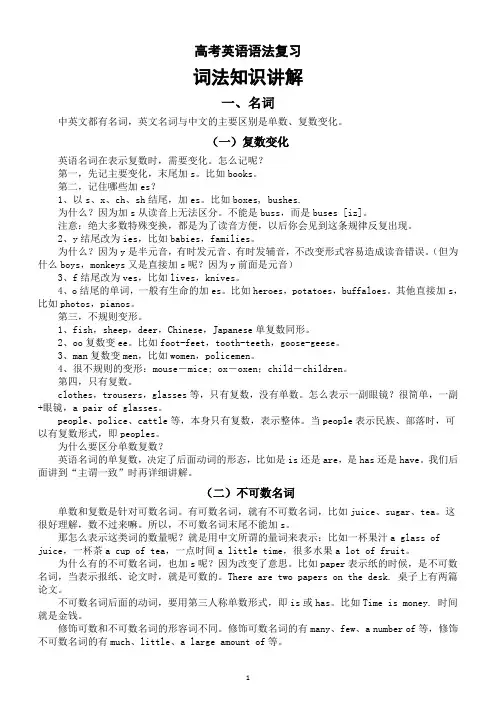
高考英语语法复习词法知识讲解一、名词中英文都有名词,英文名词与中文的主要区别是单数、复数变化。
(一)复数变化英语名词在表示复数时,需要变化。
怎么记呢?第一,先记主要变化,末尾加s。
比如books。
第二,记住哪些加es?1、以s、x、ch、sh结尾,加es。
比如boxes, bushes.为什么?因为加s从读音上无法区分。
不能是buss,而是buses [iz]。
注意:绝大多数特殊变换,都是为了读音方便,以后你会见到这条规律反复出现。
2、y结尾改为ies,比如babies,families。
为什么?因为y是半元音,有时发元音、有时发辅音,不改变形式容易造成读音错误。
(但为什么boys,monkeys又是直接加s呢?因为y前面是元音)3、f结尾改为ves,比如lives,knives。
4、o结尾的单词,一般有生命的加es。
比如heroes,potatoes,buffaloes。
其他直接加s,比如photos,pianos。
第三,不规则变形。
1、fish,sheep,deer,Chinese,Japanese单复数同形。
2、oo复数变ee。
比如foot-feet,tooth-teeth,goose-geese。
3、man复数变men,比如women,policemen。
4、很不规则的变形:mouse-mice; ox-oxen;child-children。
第四,只有复数。
clothes,trousers,glasses等,只有复数,没有单数。
怎么表示一副眼镜?很简单,一副+眼镜,a pair of glasses。
people、police、cattle等,本身只有复数,表示整体。
当people表示民族、部落时,可以有复数形式,即peoples。
为什么要区分单数复数?英语名词的单复数,决定了后面动词的形态,比如是is还是are,是has还是have。
我们后面讲到“主谓一致”时再详细讲解。
(二)不可数名词单数和复数是针对可数名词。
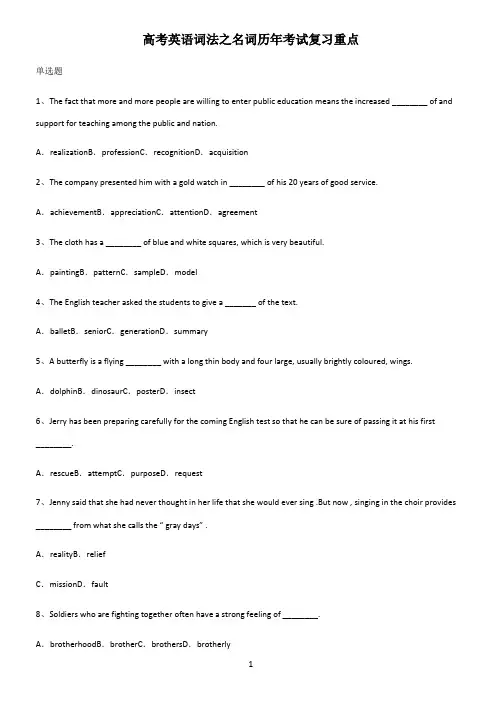
高考英语词法之名词历年考试复习重点单选题1、The fact that more and more people are willing to enter public education means the increased ________ of and support for teaching among the public and nation. A.realizationB.professionC.recognitionD.acquisition2、The company presented him with a gold watch in ________ of his 20 years of good service. A.achievementB.appreciationC.attentionD.agreement3、The cloth has a ________ of blue and white squares, which is very beautiful. A.paintingB.patternC.sampleD.model4、The English teacher asked the students to give a _______ of the text. A.balletB.seniorC.generationD.summary5、A butterfly is a flying ________ with a long thin body and four large, usually brightly coloured, wings. A.dolphinB.dinosaurC.posterD.insect6、Jerry has been preparing carefully for the coming English test so that he can be sure of passing it at his first________.A.rescueB.attemptC.purposeD.request7、Jenny said that she had never thought in her life that she would ever sing .But now , singing in the choir provides ________ from what she cal ls the “ gray days” .A.realityB.reliefC.missionD.fault8、Soldiers who are fighting together often have a strong feeling of ________. A.brotherhoodB.brotherC.brothersD.brotherly9、While most of us are only too ready to ________ others the cold wind of ________, we are somehow reluctant to give our fellows the warm sunshine of praise.A.respond to...conflictB.apply to ...criticismC.react to...threatD.reply to...superiority10、The official is preparing documents for a four-nation regional meeting on elephant ________. A.constitutionB.affectionC.conservationD.production11、He made a quick ________ to the new surroundings. In other words, he was more ________. A.adoption, adaptiveB.adaptation, adaptiveC.adapt, adaptableD.adaptation, adaptable12、You didn’t do anything wrong—you should have a clear ________. A.costumeB.corporationC.contestD.conscience13、The motor industry declares that electric cars will become mainstream (主流) over the next ________. A.entranceB.decadeC.committeeD.feedback14、In a small wooded valley ________ two towns, both set in beautiful ________.A.lies; surroundingB.lie; surroundingsC.lay; surroundingD.did lie; surroundings15、Yuan Longping devoted his life to the research and development of high-yielding rice, making outstanding contributions to China’s food ________.A.lackB.cuisineC.securityD.purchase16、I’m pleased that we do have the________ to produce so much food. A.frictionB.clueC.capacityD.physician17、Jay Leno, the host of the “Tonight” show, once said that every new challenge put all the resources of the host tothe test, and most solutions belonged to the ________.A.accidentB.customC.eventD.occasion18、Music should be taught on a regular basis in schools because of the ______ it can bring to the development of children’s brains.A.systemsB.prioritiesC.barriersD.benefits19、My brother is a policeman.划线成分是________A.主语B.谓语C.宾语D.表语20、The police ordered him not to leave the city without ________. A.atmosphereB.baconC.curiosityD.permission21、Though David received the________ from the school basketball team, he didn’t give up his dream and continued practicing hard.A.interactionB.companionshipC.cooperationD.rejection22、To the great _____ of the citizens, no one else was infected with the coronavirus except the 136 confirmed cases. A.relaxationB.disappointmentC.reliefD.surprise23、There is no need to tell me your answer now. Give it some________ and then let me know. A.thoughtB.strengthsC.protectionD.authority24、Professor Wang offered two graduate courses last _______. A.flashB.teenagerC.semesterD.focus25、The athletes are anxiously waiting for the final ________ of the game, because it is essential for them to go into the next round.A.outcomeB.outlineC.comebackD.cooperation26、Tom’s parents’ behavior, as well as their words ________ a key effect on him during the past twenty years.A.haveB.have hadC.has hadD.has27、We’ve had a few _________, but we’re still good friends. A.disagreeB.disagreesC.disagreementD.disagreements28、The lockdown hobbled India's economy and its GDP recorded the sharpest ________ in its history. A.motionB.dissatisfactionC.conservationD.contraction29、In our mind, Professor Wang is a learned and kind man, so we showed our ________for him. A.attentionB.respectC.struggleD.request30、That flood has been ________ several times to prove that it’s important to take preventive________. A.referred to, actionsB.referred, measureC.referred, actionD.referred to, measures31、Because of the tight________ and heavy workload of Grade 12, many students have to make use of their lunch break to finish homework.A.scheduleB.pressureC.performanceD.impression32、Norris twice knocked down his ________ in the early rounds of the fight. A.opponentB.asteroidC.nephewD.triathlete33、The winner will receive ________ of books.A.a ten pound worthB.ten pound worthyC.ten pounds' worthD.ten pounds' worthy34、The selection process in the job market is based on standard tests of ________ and experience. A.conceptB.crewC.competenceD.cruelty35、As a soldier, he showed selfless________ to duty. A.devotionB.conservationC.assumptionD.comparison36、The university will reach its_________ of 5,000 students next September. A.accountB.benefitC.targetD.process37、The________ gained from this experience has invested my life with new meaning. A.departureB.insightC.proofD.setting38、There are ________ people in the cinema.A.two hundredB.two hundredsC.two hundred of39、The government has taken some ________ to solve the problem. A.measuresB.atomsC.novelsD.peppers40、Despite years of ________ from publishers, she persevered in her attempt to establish herself as a writer. A.enduranceB.rejectionC.blessingD.companionship41、This new variety of music is a ________ ________ around the world.A.phenomenon; spreadsB.phenomena; spreadingC.phenomenon; spreadingD.phenomena; spread42、Laziness is the ________ of his failure.A.reasonB.causeC.excuseD.way43、Procrastination can often pose________to people’s ability________their goals successfully, which is evident, for example, in the fact that it is associated with receiving worse grades at school.A.a question … of pursuingB.an obstacl e … to pursueC.a dilemma … to pursueD.a hindrance … to pursuing44、Although three teams adopted different ______ to the problem, they all succeeded. A.methodsB.waysC.approachesD.means45、We've made our plans, and now we must put them into ________ . A.factB.practiceC.realityD.deed高考英语词法之名词_01E参考答案1、答案:C解析:考查名词词义辨析。
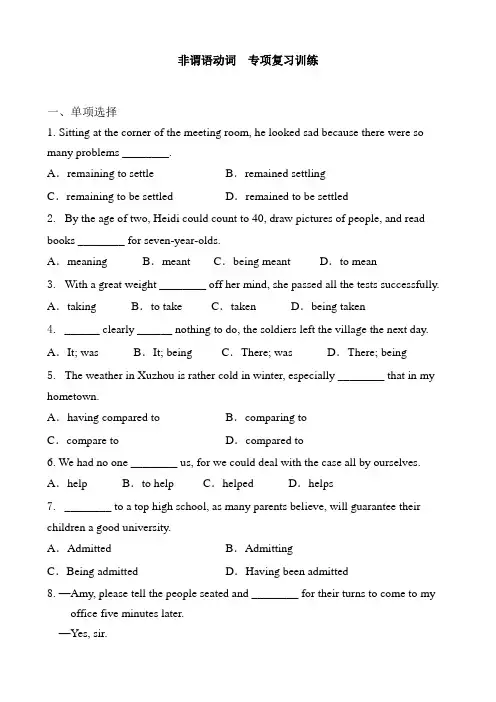
非谓语动词专项复习训练一、单项选择1. Sitting at the corner of the meeting room, he looked sad because there were so many problems ________.A.remaining to settle B.remained settlingC.remaining to be settled D.remained to be settled2. By the age of two, Heidi could count to 40, draw pictures of people, and read books ________ for seven-year-olds.A.meaning B.meant C.being meant D.to mean3. With a great weight ________ off her mind, she passed all the tests successfully. A.taking B.to take C.taken D.being taken4. ______ clearly ______ nothing to do, the soldiers left the village the next day. A.It; was B.It; being C.There; was D.There; being5. The weather in Xuzhou is rather cold in winter, especially ________ that in my hometown.A.having compared to B.comparing toC.compare to D.compared to6. We had no one ________ us, for we could deal with the case all by ourselves. A.help B.to help C.helped D.helps7. ________ to a top high school, as many parents believe, will guarantee their children a good university.A.Admitted B.AdmittingC.Being admitted D.Having been admitted8. —Amy, please tell the people seated and ________ for their turns to come to myoffice five minutes later.—Yes, sir.A.wait B.waiting C.waited D.to wait9. ________ several important decisions based on emotion instead of reason, he felt bitterly regretted.A.Making B.Having made C.Made D.To make10. —Do you think you could get this package ________ for me, please?—No problem!A.to mail B.mailed C.mailing D.mail11. ________ enough money, Li Hua was unable to buy the new house.A.Not saved B.Not having savedC.Not to save D.Not saving12.Misunderstandings ____ from lack of social communication, unless _____ properly, may lead to serious problems.A.arisen; handling B.arising; handledC.rising; handled D.risen; handling13.If water becomes increasingly scarce in decades ________,water shortage will become a hot issue all over the world.A.coming B.having come C.to come D.to be coming14.________ the English speech competition will be a lot of work, so I need some volunteers to help out.A.Organize B.Organized C.Organizing D.Being organized 15.The new books _____ in the factory these days are mainly intended for children. A.printing B.to print C.being printed D.to be printed二、用括号里所给动词的正确形式填空1. Unfortunately, we rushed the fallen old man to hospital, only ________ (tell) that we were responsible for him.2. ________ (show) around the university, we then were taken to a building, where many scientists worked.3. ________ (attract) more tourists, travel agencies from both China and the DPRK have developed a package of new products.4. When I got back home I saw a note pinned to the door, ________ (read) “Sorry to miss you; I will call you later.”5. Helena was excited, just as I had imagined, ________ (find) her lost pet.6. Despite the government's measures to cool the house market, housing demand in China still grew steadily in the second half of 2012,________ (result)in a rapid rise in house prices.7. She will tell us why she feels so strongly that each of us has a role ________ (play) in making the earth a better place to live in.答案与解析:一、1. C 解析:remain在there be结构中作后置定语,由于remain是不及物动词,故应用现在分词remaining;且settle与problems之间构成动宾关系,所以用动词不定式的被动形式。
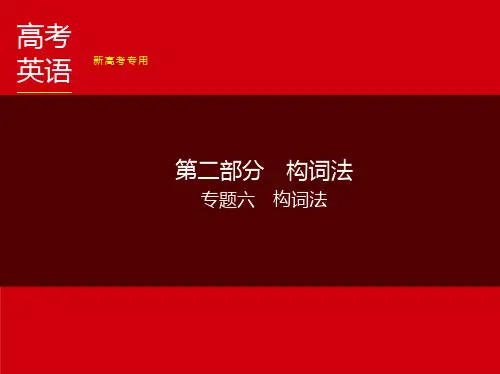
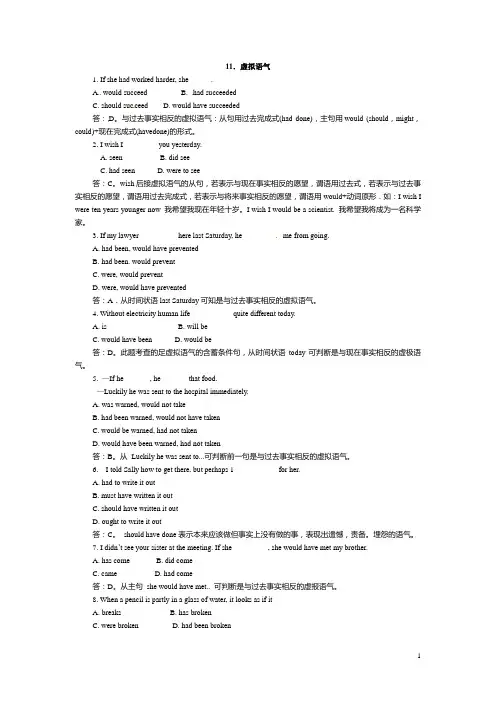
11.虚拟语气1. If she had worked harder, she______.A. would succeedB. had succeededC. should suc ceedD. would have succeeded答:D。
与过去事实相反的虚拟语气:从句用过去完成式(had done),主句用would (should,might,could)+现在完成式(havedone)的形式。
2. I wish I_________ you yesterday.A. seenB. did seeC. had seenD. were to see答:C。
wish后接虚拟浯气的从句,若表示与现在事实相反的愿望,谓语用过去式,若表示与过去事实相反的愿望,谓语用过去完成式,若表示与将来事实相反的愿望,谓语用would+动词原形.如:I wish I were ten years younger now 我希望我现在年轻十岁。
I wish I would be a scientist. 我希望我将成为一名科学家。
3. If my lawyer__________ here last Saturday, he__________ me from going.A. had been, would have preventedB. had been. would preventC. were, would preventD. were, would have prevented答:A.从时间状语last Saturday可知是与过去事实相反的虚拟语气。
4. Without electricity human life___________ quite different today.A. isB. will beC. would have beenD. would be答:D。
此题考查的足虚拟语气的含蓄条件句,从时间状语today可判断是与现在事实相反的虚极语气。

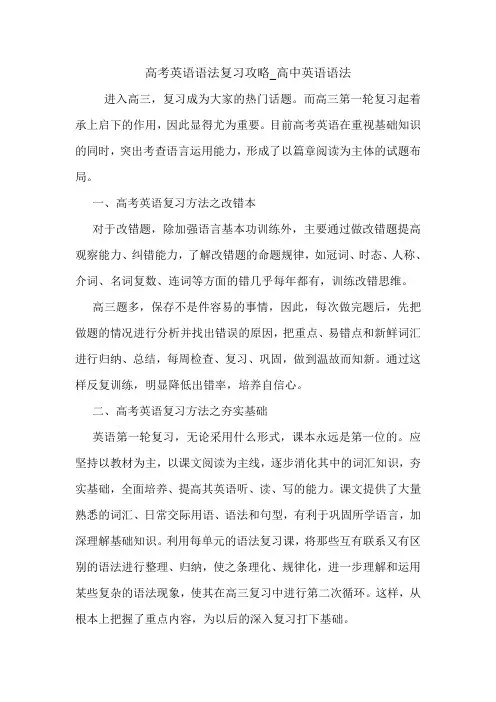
高考英语语法复习攻略_高中英语语法进入高三,复习成为大家的热门话题。
而高三第一轮复习起着承上启下的作用,因此显得尤为重要。
目前高考英语在重视基础知识的同时,突出考查语言运用能力,形成了以篇章阅读为主体的试题布局。
一、高考英语复习方法之改错本对于改错题,除加强语言基本功训练外,主要通过做改错题提高观察能力、纠错能力,了解改错题的命题规律,如冠词、时态、人称、介词、名词复数、连词等方面的错几乎每年都有,训练改错思维。
高三题多,保存不是件容易的事情,因此,每次做完题后,先把做题的情况进行分析并找出错误的原因,把重点、易错点和新鲜词汇进行归纳、总结,每周检查、复习、巩固,做到温故而知新。
通过这样反复训练,明显降低出错率,培养自信心。
二、高考英语复习方法之夯实基础英语第一轮复习,无论采用什么形式,课本永远是第一位的。
应坚持以教材为主,以课文阅读为主线,逐步消化其中的词汇知识,夯实基础,全面培养、提高其英语听、读、写的能力。
课文提供了大量熟悉的词汇、日常交际用语、语法和句型,有利于巩固所学语言,加深理解基础知识。
利用每单元的语法复习课,将那些互有联系又有区别的语法进行整理、归纳,使之条理化、规律化,进一步理解和运用某些复杂的语法现象,使其在高三复习中进行第二次循环。
这样,从根本上把握了重点内容,为以后的深入复习打下基础。
三、高考英语复习方法之听力训练听力的练习要在掌握相应的听力策略的前提下做到持之以恒。
练习听力的时候要学会抓住关键词语,学会预测,并做到边听边分析综合,听力测试问题的类型一共就这几个类型,概括中心话题,推理判断,对谈话细节等问题要心中有数,对常考的谈话内容如打电话,买东西,看病,用餐,活动安排,表示看法等要做到熟悉而不陌生,听力的提高不是一个早晨就能实现的,它是慢功夫,但是要经常听,肯定会有大的长进。
其次听力训练要掌握相应的听力策略,用什么技能听懂什么。
当听不懂时,要思考自己在哪些地方欠缺知识而不能听懂。
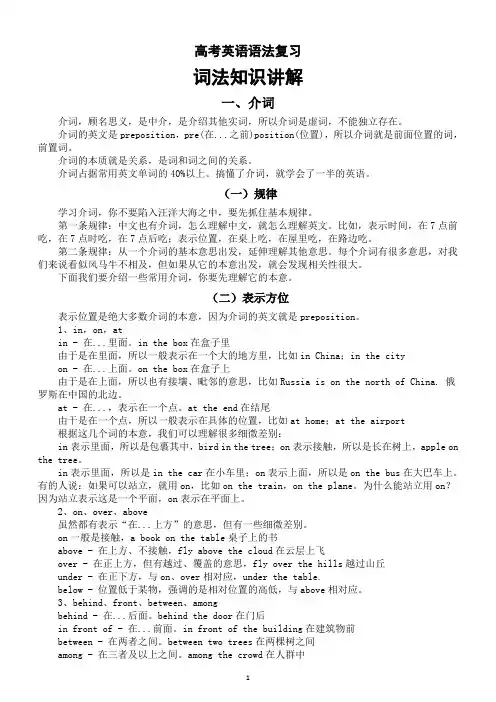
高考英语语法复习词法知识讲解一、介词介词,顾名思义,是中介,是介绍其他实词,所以介词是虚词,不能独立存在。
介词的英文是preposition,pre(在...之前)position(位置),所以介词就是前面位置的词,前置词。
介词的本质就是关系,是词和词之间的关系。
介词占据常用英文单词的40%以上。
搞懂了介词,就学会了一半的英语。
(一)规律学习介词,你不要陷入汪洋大海之中,要先抓住基本规律。
第一条规律:中文也有介词,怎么理解中文,就怎么理解英文。
比如,表示时间,在7点前吃,在7点时吃,在7点后吃;表示位置,在桌上吃,在屋里吃,在路边吃。
第二条规律:从一个介词的基本意思出发,延伸理解其他意思。
每个介词有很多意思,对我们来说看似风马牛不相及,但如果从它的本意出发,就会发现相关性很大。
下面我们要介绍一些常用介词,你要先理解它的本意。
(二)表示方位表示位置是绝大多数介词的本意,因为介词的英文就是preposition。
1、in,on,atin - 在...里面。
in the box在盒子里由于是在里面,所以一般表示在一个大的地方里,比如in China;in the cityon - 在...上面。
on the box在盒子上由于是在上面,所以也有接壤、毗邻的意思,比如Russia is on the north of China. 俄罗斯在中国的北边。
at - 在...,表示在一个点。
at the end在结尾由于是在一个点,所以一般表示在具体的位置,比如at home;at the airport根据这几个词的本意,我们可以理解很多细微差别:in表示里面,所以是包裹其中,bird in the tree;on表示接触,所以是长在树上,apple on the tree。
in表示里面,所以是in the car在小车里;on表示上面,所以是on the bus在大巴车上。
有的人说:如果可以站立,就用on,比如on the train,on the plane。
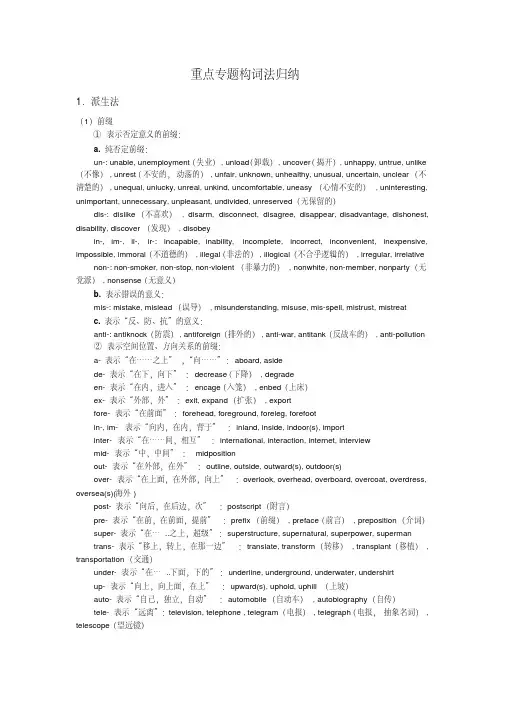
重点专题构词法归纳1.派生法(1)前缀①表示否定意义的前缀:a. 纯否定前缀:un-: unable, unemployment(失业), unload(卸载), uncover(揭开), unhappy, untrue, unlike (不像), unrest(不安的,动荡的), unfair, unknown, unhealthy, unusual, uncertain, unclear(不清楚的), unequal, unlucky, unreal, unkind, uncomfortable, uneasy(心情不安的), uninteresting, unimportant, unnecessary, unpleasant, undivided, unreserved(无保留的)dis-: dislike(不喜欢), disarm, disconnect, disagree, disappear, disadvantage, dishonest, disability, discover(发现), disobeyin-, im-, il-, ir-: incapable, inability, incomplete, incorrect, inconvenient, inexpensive, impossible, immoral(不道德的), illegal(非法的), illogical(不合乎逻辑的), irregular, irrelative non-: non-smoker, non-stop, non-violent(非暴力的), nonwhite, non-member, nonparty(无党派), nonsense(无意义)b. 表示错误的意义:mis-: mistake, mislead(误导), misunderstanding, misuse, mis-spell, mistrust, mistreatc. 表示“反、防、抗”的意义:anti-: antiknock(防震), antiforeign(排外的), anti-war, antitank(反战车的), anti-pollution②表示空间位置、方向关系的前缀:a- 表示“在……之上”,“向……”:aboard, asidede- 表示“在下,向下”:decrease(下降), degradeen- 表示“在内,进入”:encage(入笼), enbed(上床)ex- 表示“外部,外”:exit, expand(扩张), exportfore- 表示“在前面”:forehead, foreground, foreleg, forefootin-, im- 表示“向内,在内,背于”:inland, inside, indoor(s), importinter- 表示“在……间,相互”:international, interaction, internet, interviewmid- 表示“中,中间”:midpositionout- 表示“在外部,在外”:outline, outside, outward(s), outdoor(s)over- 表示“在上面,在外部,向上”:overlook, overhead, overboard, overcoat, overdress, oversea(s)(海外)post- 表示“向后,在后边,次”:postscript(附言)pre- 表示“在前,在前面,提前”:prefix(前缀), preface(前言), preposition(介词)super- 表示“在…..之上,超级”:superstructure, supernatural, superpower, superman trans- 表示“移上,转上,在那一边”:translate, transform(转移), transplant(移植), transportation(交通)under- 表示“在…..下面,下的”:underline, underground, underwater, undershirtup- 表示“向上,向上面,在上”:upward(s), uphold, uphill(上坡)auto- 表示“自己,独立,自动”:automobile(自动车), autobiography(自传)tele- 表示“远离”:television, telephone , telegram(电报), telegraph(电报,抽象名词), telescope(望远镜)③表示时间,序列关系的前缀:fore- 表示“在前面,先前,前面”:foreword(前言), forecast(预报), foretell(预言), foresee(预见), foreknow(先知), foreknowledge(先知)mid- 表示“中,中间”:midnight, midsummer, mid-day, mid-autumnpost- 表示“在后,后”:postwar, postgraduate(研究生), postdatepre- 表示“在前,事先,预先”:preheat, prewar, prehistory(史前), preview(预习), prebattle, prepayre- 表示“再一次,重新”:retell(复述), rewrite, renew(续借), reconsider, reuse, remarry, recycle(回收利用), rebuild④表示比较程度差别关系的前缀:by- 表示“副,次要的”:byproduct(副产品), bywork(副业)extra- 表示“超越,额外”:extraordinaryover- 表示“超过,过度,太”:overeat(吃过多), oversleep(睡过头), overpraise(过奖), overwork, overact(行为过分), overdounder- 表示“低劣,低下”:undersize, undergrown, underproduction(生产不足)vice- 表示“副,次”:vice-president, vice -chairman⑤表示共同,相等意思的前缀:co- 表示“共同,一起”:coexist(共同生存), co-operate, co-worker, coactions(合作行动), coauthor(合作作者)⑥表示某种状态,构成形容词、副词或动词:a- afraid, alive, alone, asleep, ashamed, aloud, ahead, aside, alike, awake⑦表示分离,离开意思的前缀:a- 表示“分离,离开”:away, apartde- 表示“离去,处去”:depart, decolour⑧表示“自我”:self- self-protect(ion), self-made, self-knowledge⑨表示变换词类作用的前缀:be- befrienden- enslave, enable, enrich, enlarge, encourage⑩表示数量关系的前缀:a. 表示“单一”,“一”:uni- uniform(统一服装), unicellular(单细胞)b. 表示“二,两,双”:bi- bicycletwi- twilightc. 表示“半,一半”:semi- semiconductor(半导体), semicircle(半圆), semimonthly(半月刊), semifinal (半决赛)d. 表示“百,百分之一”:centi- centimetere. 表示“千,千分之一”:kilo- kilometer, kilogram, kilowattf. 表示“微小”:micro- microvolt(微伏特), microcomputer(微机), microscope(显微镜)g. 表示“许多,复,多数”:multi- multimedia(多媒体), multicolored, multiform, multinaturalh. 表示“千分之一、毫”:milli- millimeter, milligrami. 表示“微小、微型”:mini- minibus, miniskirt, minipark(2)后缀①名词后缀:a. 具有某种职业或动作的人:-an, -ian, -ician 表示“……地方的人,精通……的人”:American, Asian, Australian, Russian, Italian , historian, librarian, electrician, magician(魔术师), technician, musician, politician(政客), physician(内科医生),-ant,-ent 表示“……人”:merchant, servant, assistant, agent, student,-ee 表示“动作承受者”:employee(雇员), examinee, payee(收款人), interviewee -eer 表示“从事于……人”:engineer, volunteer(志愿者)-er 表示“从事某种职业的人, 某地区,地方的人”:banker, observer, Londoner, villager singer, driver, writer, speaker, traveller, buyer-or 表示“……者”:author, doctor, operator, actor, visitor, inventor, educator-ar, -ary 表示“……的人, 从事……的人”:scholar, liar, beggar, secretary, missionary -ese 表示“……国人,……地方的人”:Chinese, Japanese, Cantonese(广东人)-ess 表示“阴性人称名词”:actress(女演员), hostess(女主人), manageress(女经理)-ist 表示“从事……研究者,信仰……主义者”:pianist, communist, dentist, artist, chemist, socialist, typist, receptionist-icist 表示“……家,……者, ……能手”:physicist, phoneticist(语音学家), technicist -logist 表示“……学家,研究者”:biologist, geologist(地质学家)b. 构成具有抽象名词的含义:-age 表示“状态,行为,身份及其结果,总称”:courage, storage, marriage, percentage -al 表示“事物的动作,过程”:refusal, arrival, survival, denial, approval, trial, burial-ance, -ence 表示“性质,状况,行为,过程,总量,程度”:importance, distance, avoidance, appearance, performance, diligence, difference, obedience, absence, presence(出席), existence -ancy, -ency 表示“性质,状态,行为,过程”:frequency(频繁), urgency(紧急), efficiency (高效率),-ity 表示“性质,状态,程度”:purity, reality, equality-bility 表示“动作,性质,状态”:ability, possibility, probability, responsibility-dom 表示“等级,领域,状态”:freedom, kingdom, wisdom-ery, -ry 表示“行为,状态,习性,性质”:bravery, slavery-hood 表示“资格,身份, 年纪,状态”:childhood, girlhood, boyhood, manhood-ice 表示“行为,性质,状态”:notice, justice, service-ing 表示“动作的过程,结果”:building, writing, learning-ion, -ation, -ition, -sion 表示“行为的过程,结果,状况”:suggestion, action, solution, invention, direction, correction, collection, instruction, destruction, introduction, congratulation, dictation, invitation, pronunciation, examination, graduation, operation, education, information, translation, starvation, satisfaction, relation, irrigation, determination, preparation, imagination, explanation, opposition, competition, description, decision, division, conclusion, explosion,impression, expression, admission, permission, discussion-ment 表示“行为,状态,过程,手段及其结果”:disappointment, treatment, movement, judgment, punishment, argument, agreement, government, development, improvement, requirement, astonishment, encouragement-ness 表示“性质,状态,程度”:goodness, kindness, tiredness, friendliness, business, illness, happiness, goodness, willingness, weakness, fairness-ism 表示“制度,主义,学说,信仰,行为”:socialism, criticism, heroism, tourism, communism(共产主义), Marxism(马克思主义)-ship 表示“情况,性质,技巧,技能及身份,职业”:hardship, relationship, membership, friendship, seamanship, ownership, scholarship, professorship-th, 表示“动作,性质,过程,状态”:strength, length, width, depth, wealth, truth, growth, warmth, youth-ure 表示“行为,结果”:exposure(暴露), pressure, failure, procedure(手续), mixture -craft 表示“工艺”:aircraft, needlecraft, woodcraftc. 带有场所,地方的含义:-age 表示“住所,地点”:village, cottage-ary 表示“住所,场地”:library, granary (谷仓)-ory 表示“工作场所,住处”:factory, dormitory, laboratory, observatory②形容词后缀:a. 带有“属性,倾向,相关”的含义:-able, -ible: movable, comfortable, eatable, enjoyable, acceptable, reasonable, applicable, visible, responsible, terrible, horrible-al: natural, additional, educational, national-ant, -ent: distant, important, excellent-ing(表示特征:令人觉得): moving, touching, daring, interesting, exciting, disappointing , astonishing, boring, amazing-ed(表示情绪:觉得): pleased, interested, surprised, worried, excited, bored, determined, delighted-ish: foolish, bookish, selfish-ive: active, impressive, decisive, active, instructive, expensive, progressiveb. 表示“相象,类似”的含义:-ish: boyish, childish-like: manlike, childlike-some: troublesome, handsome-y: milky, cloudy sunny, windy, rainy, foggy, healthy, wealthy, worthy, bloody, funny, dirty, lucky, noisy, salty, smelly, hilly-ly: manly, fatherly, motherly, sisterly, brotherly, daily, weekly, monthly, quarterly, yearly, friendly, lonely, orderly, lovely, lively, likely, scholarlyc. 表示“充分的”含义:-ful: beautiful, wonderful, helpful, truthful, successful, harmful, useful, careful, forgetful, merciful-ous: dangerous, courageous, nervous, mountainous, humorous, variousd. 表示由某种物质形成,制成或生产的含义:-en: wooden, golden, woolene. 表示方向的含义:-ern: eastern, western, southern, northern, southeastern, northwestern-ward: downward, forwardf. 表示“数量关系”的含义:-teen: thirteen-ty: fifty-th: fourth, fiftiethg. 表示国籍,语种,宗教的含义:-an: Roman, European-ese: Chinese, Japanese-ish: English, Spanishh. 表示否定:-less: countless, stainless(不锈的), wireless, useless, endless, priceless(无价的,贵重的), hopeless③动词后缀:-ize, ise 表示“做成,变成,……化”:modernize(现代化), democratize(民主化), organize, apologize, realize-en 表示“使成为,引起,使有”:quicken, weaken, soften, harden-fy 表示“使……化, 使成”:beautify, purify(净化), intensify, signify, simplify(简化), satisfy④副词后缀:-ly: possibly, swiftly, simply-ward(s): downward, inwards, upward-ways: always, sideways-wise: otherwise, clockwise注意:有的单词有双重后缀,如:use(用途)→useless(无用的)→uselessness(无用)self(自己)→selfish(自私的)→selfishness(自私)有的单词则是前后缀同时使用,如:important→importance→unimportanceregular(有规律的,有规则的)→irregular(无规律的,不规则的)→irregularity(无规律,不规则)2.合成法(1)合成名词boyfriend, girlfriend, bus-driver, necklace, playground, radioactive, headmaster, sunshine, notebook, armchair, wheelchair, postcard, football, spaceship, blackboard, firefighter, fireman, gateman, chairman, weatherman, businessman, armyman, postman, sportsman, bedroom, reading-room, classroom, newspaper, pickpocket(扒手), she-goat(雌性山羊), editor-in-chief (主编), daybreak(破晓), handshake(握手), silkworm(蚕), outbreak(爆发)(2)合成形容词名词+动词过去分词:man-made, homemade副词+动词过去分词:well-known, newly-built(新建的)形容词+名词ed:kind-hearted, cold-blooded数词+名词ed:five-storeyed(五层楼的), four-legged(四条腿的)名词+动词现在分词:English-speaking, Chinese-speaking, brainwashing(洗脑的)由三个词构成的合成形容词:face-to-face, heart-to-heart, two-year-old, eight-metre-long 其他合成形容词:everyday(日常的), faraway(遥远的), snow-white(雪白的), lay-off (下岗的)3.转化法(1)名词→动词hand(手→传递)back(背部,后面→支持,后退)charge(费用→收费)copy(抄本,复印件→抄写,复印)flood(洪水→淹没)heat(热量→加热)paint(油漆→刷漆)phone(电话→打电话)pin(别针→装订)waste(废物→浪费)face(脸→面对)use(用途→使用)interest(兴趣→使兴趣)surprise(惊讶→使惊讶)taste(味道→品尝)smell(气味→闻)break(短暂休息→折断)present(礼物→赠送)(2)形容词→动词clean(干净→使干净,打扫)clear(清楚→清理)dirty(脏→弄脏)dry(干燥→烘干,晒干)empty(空的→倒空)free(自由→使自由,释放)slow(慢的→放慢)warm(暖和→使暖和)cool(凉的→冷却)quiet(安静→使安静)。
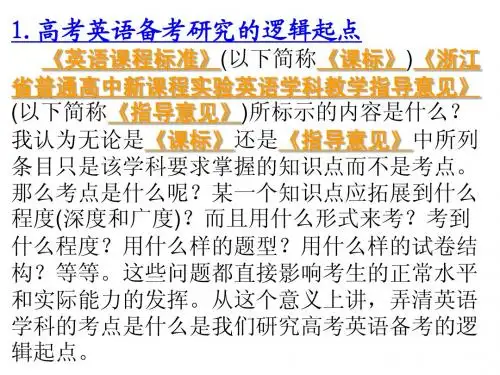
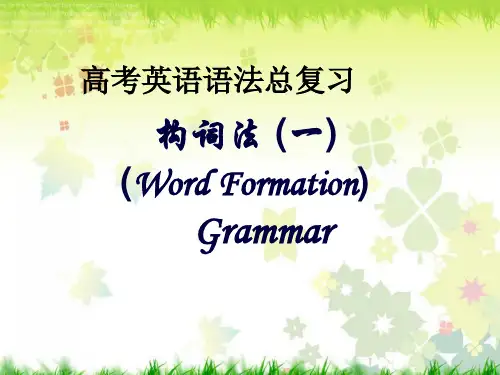
形容词和副词1.These oranges taste________.A. goodB. wellC. to be goodD. to be well答:A.taste为系动词,后接形容词。
2.Which do you think tastes ______, the chicken or the fishy?A. wellB. goodC. betterD. best答:C。
better为good的比较级。
3.If we had followed his plan, we eould have done the work better with_______ money and______ peopll.A. little, fewerB. fewer,lessC. less, fewerD. 1ess, few答:C。
1ittle修饰不可数名词,few修饰可数名词。
less money and fewer people用较少的财力和人力。
4. John has three sisters. Mary is the_______ of the three.A. most cleverestB. more cleverC. cleverestD. cleverer答:C。
clever的比较级和最高级形式是词尾接-er和-est。
从题干中of the thtee可判断是最高级形式(用于三者以上的比较)。
5. The horse is getting old and cannot run _________ it did.A. as faster asB. so fast thanC. so faster asD. as fast as答:D。
as...as和so...as中间都接原级。
as...as用于肯定或否定句;so...as仅用于否定句.6. He had never spent a_______ day.A. more worryB. most worryingC. more worryingD. most worried答:C.a most worrying day 相当于a very worrying day,与句意不符。
高考英语词法之名词基础知识点归纳总结单选题1、My brother is a policeman.划线成分是________A.主语B.谓语C.宾语D.表语2、The police ordered him not to leave the city without ________. A.atmosphereB.baconC.curiosityD.permission3、He can't be a doctor, for the ______ of blood always makes him feel sick. A.sightB.lookC.viewD.form4、To the great _____ of the citizens, no one else was infected with the coronavirus except the 136 confirmed cases. A.relaxationB.disappointmentC.reliefD.surprise5、The US said it was ready to join the ________ between the six countries and Iran. A.translationB.determinationC.definitionD.negotiation6、Professor Wang offered two graduate courses last _______. A.flashB.teenagerC.semesterD.focus7、The athletes are anxiously waiting for the final ________ of the game, because it is essential for them to go into the next round.A.outcomeB.outlineC.comebackD.cooperation8、Now I know that the proper way is always her way.A.objectB.object complementC.predicativeD.attribute9、Life is full of _________, so we must think clearly about how to make them before deciding. A.choicesB.candlesC.colorsD.competitions10、We have entered into age _______humans are concerned about animal welfare. A.thatB.whenC.whichD.while11、The lockdown hobbled India's economy and its GDP recorded the sharpest ________ in its history. A.motionB.dissatisfactionC.conservationD.contraction12、In our mind, Professor Wang is a learned and kind man, so we showed our ________for him. A.attentionB.respectC.struggleD.request13、Because of the tight________ and heavy workload of Grade 12, many students have to make use of their lunch break to finish homework.A.scheduleB.pressureC.performanceD.impression14、Miss Sweet’s smile always makes me feel warm and lively. It’s like a hidden ________ to me. A.treasureB.traditionC.interviewD.competition15、The winner will receive ________ of books.A.a ten pound worthB.ten pound worthyC.ten pounds' worthD.ten pounds' worthy16、The selection process in the job market is based on standard tests of ________ and experience. A.conceptB.crewC.competenceD.cruelty17、As a soldier, he showed selfless________ to duty. A.devotionB.conservationC.assumptionD.comparison18、Some experts claim that the________ of students should cover more aspects, such as activity involvement and teamwork contributions.A.admissionB.assessmentC.awarenessD.ambition19、We made him our monitor.划线成分是________A.宾语B.定语C.状语D.宾补20、The sunrise is a beautiful ________ in the morning.A.traditionB.gravityC.sceneD.dessert21、Despite years of ________ from publishers, she persevered in her attempt to establish herself as a writer. A.enduranceB.rejectionC.blessingD.companionship22、This new variety of music is a ________ ________ around the world.A.phenomenon; spreadsB.phenomena; spreadingC.phenomenon; spreadingD.phenomena; spread23、Procrastination can often pose________to people’s ability________their goals successfully, which is evident, for example, in the fact that it is associated with receiving worse grades at school.A.a question … of pursuingB.an obstacle … to pursueC.a dilemma … to pursueD.a hindrance … to pursuing24、As an experienced cook, her main cooking ________ is to use only fresh ingredients. A.innovationB.philosophyC.trendD.sample25、We will be posting a series of __________ regularly form now on so those who read our posts won’t be concerned about us.A.issuesB.updatesC.descriptionsD.schedules26、We've made our plans, and now we must put them into ________ . A.factB.practiceC.realityD.deed27、Don’t scold him. He was just trying to do a good _________.A.thingB.actC.mannerD.deed28、More recently, the internationalization of financial markets, the spread of information by electronic media and other aspects of globalization have intensified the ________to “small” languages.A.threatB.siteC.rangeD.extinction29、Working on this paper is my first step towards becoming a journalist, so this has been ________ for me. A.a successB.succeedC.successD.is successful30、—I’m sure his speech has had a great ________ on the people there.—Yes, they were deeply moved.A.impactB.advanceC.harmonyD.accommodation31、Patience is an important________ of a happy and rewarding life. After all, there is always something worth waiting for in our life.A.lessonB.experienceC.purposeD.quality32、The ______ of the pain can be easily achieved but the disease can be hardly cured. A.harmonyB.relaxationC.reliefD.ease33、It might be very difficult to find the ________ of the information. A.causeB.resourceC.courseD.source34、We have all come into the world with a/an ________ in life and we can all contribute to making the world a better place.A.missionB.substanceC.authorityD.collision35、Dieting and exercising can bring your weight under control but you must stick to your plan with ________. A.insightB.perseveranceC.confirmationD.achievement36、Police have arrested a ________ in a series of killing in the city.A.suspectB.conflictC.virus37、I owe you a(an) _________for having kept you waiting for such a long time. A.judgmentB.argumentC.apologyD.intention38、The present ________ of education needs improving.A.systemB.dawnC.cometD.vitamin39、The boss has ________in solving such a problem.A.many experiencesB.many experiencedC.much experiencedD.much experience40、As senior three students, we had better follow the ________as much as possible from our teachers and parents; although they are a bit nagging(唠叨), indeed we are expected to make _________ in all aspects.A.advice; progressB.advices; progressC.advices; progressesD.advice; progresses41、Lack of mutual________not only gets in the way of your work, but it can also________your relationships and your self-esteem.A.comment … differB.respect … damageC.benefit … destroyD.expectation … decorate42、The students are having a(n)________on whether children should attend tutorial classes or not after school. A.encounterB.debateC.impactD.reaction43、The stronger the ________ is, the more quickly a man will learn a new skill. In other words, it is up to whether he has an interest in it.A.motivationB.cooperationC.qualificationD.interaction44、The car factory has produced a new car of high quality; its only _________ is that it uses a lot of petrol. A.advantageB.profitC.mistakeD.drawback45、The first warning was from a ________station further in the harbor telling me to stop, that we were approaching danger.A.sighB.signC.signalD.image高考英语词法之名词_018参考答案1、答案:D解析:考查句子成分。
高考英语语法和词法部分复习系列之一1.She is always ready to help people in trouble beaus she thinks it is a _______.A decision B. chance C pride D pleasure2.—Mum, I’ m going to visit my aunt. What about a week?—A week is too long .Try to be back in a ______ of days.A. numberB. dozenC. coupleD. score3. He is always full of _______ as though he never knew tiredness.A. strengthB. energyC. forceD. spirit4. Does this novel give you good ______ for your money?A. worthB. costC. valueD. price5. Now that time is limited, I’ll put it in _____A. generalB. secretC. allD. short6.1 think it’s great _____ to work here! People around are kind to me.A. surpriseB. jobC. funD. pleasure7.He had a good __ of the exami nation result when he saw his daughter’s face.A. reportB. thoughtC. ideaD. news8. —Hew can I use this washing machine?--Well, just refer to the ________A. explanationsB. expressionsC. instructionsD. directions9.Julie went to the ______ to buy a pair of shoes.A. shoes storeB. shoe storeC. shoe’ s storeD. shoes’ store10. You can take as many as you like because they are free of ______A. fareB. chargeC. moneyD. pay11 . It wan’ t make mu ch _______ whether you agree or not.A. troubleB. differenceC. troublesD. differences12. He left ______ with my secretary that he would call again in the afternoon. He said he would keep ______.A. words ; his wordsB. word; his wordC. word; wordD. the word; his word13. It’s important for us to employ a word or or a phrase according to the ___ in language studies.A. situationB. expressionC. conditionD. translation14. With spaceships, space _______ will become much cheaper.A. journeyB. tripC. travelD. voyage15.We had tried everything, but it made little ______A. goodB. useC. resultD. difference16. Pop music is loved by lots of people, but it is not to everyone’s______.A. smellB. favorC. soundD. taste17 ‘There are many dif ferent forms of _______ that we can make use of, such as gas, oil ,winds , waves and so on.A. energyB. sourceC. forceD. matter18. Helen said she would like to go to Atlanta by air, but 1 wonder if she had enough money to pay for the _______A. travelB. tourismC. journeyD. count 19—How much did the coat cost?--Just five dollars. It’s a real _______A. bargainB. suitC. dressD. goods20. It’s the _____ in this country to go out and pick flowers on the first day of spring.A. useB. customC. habitD. saying21. Hundreds of people leave their village to seek their _______ in cities.A .luck B. chance C. fortune D. future22.He is ______ as a manager but he doesn’t become proud of his ______A. successful ; successB. success; successC. a success; successD. success ;successes23.The storm did a lot of ______ and caused some ________A damage ;death B. damages ;deaths C. damage ;deaths D. damages ;death24.1 have some ______ in my pocket. In other words, I have some ______ with me.A. coin; changeB. coins; changeC. coin; changesD. coins; changes25. In the botanic garden we can find a(n) ______ of plants that range from tall trees to small flowers.A. typeB. groupC. amountD. variety26. In my ______,we should eat more vegetables than meat.A. ideaB. thoughtC. wayD. opinion27.1 cant afford the car because of the high ______A. costB. valueC. worthD. price28. In recent years inflation(通货膨胀) has almost doubled that _____of living in the U.S.AA. priceB. standard C cost D. condition29. I’ve listened to Dr Johnson’s talk about pollution, but I still haven’t a good understanding of its key______A. wordsB. pointsC. informationD. notes30. —Would you be so kind as to give me a ___? I’m too tired to walk any further.--I’m so sorry, but the car’s too crowded.A. placeB. driveC. seatD. lift31. Enough of it! Nobody here thinks that what you are saying should make any ___A. excuseB. senseC. useD. value32. —How dare you play on such thin ice?--Playing on ice is not my_____ of spending spare time.A .idea B. thought C. mind D. attention33. The television was repaired but not quite to the owner’s ______A. joyB. pleasureC. surpriseD. satisfaction34 . I knew ____ was ahead. Whenever Dad’s face turns red, look out!A. sufferingB. difficultyC. trouble 1). danger35 If the company wants to give mc, they have to give me three months’ _______A. adviceB. informationC. noticeD. message36.1 can’t ad vise you what to do; you must use your own ______A. opinionB. purposeC. thoughtD.judgement37.Mary has such an bad cold that she lost all ____ of smell.A. skillB. abilityC. strengthD. sense38.So many people wanted to have a look at the rare art works. Each one had to wait his _____ to look at it.A. turnB. timeC. dutyD. chance39.You must get there within half an hour . There should be no ____ in sending the blood to the dying man.A. worryB. delayC. timeD. service40.My parents always let me have my own ____ of living .A. wayB. methodC. mannerD. means41.If he wants to get to New York in time for the conference, he has no ____ but to go by plane.A. changeB. choiceC. methodD.chance42. Some of the passengers told the reporters about their _____ in the burning train.A. details B .trips C. events D. experiences43.As a writer, he succeeded in calling ____ to many of the terrible wrongs that exited at that time.A interest B. attention C. notice D mind44. The rescue team made every ______ to find the missing mountain climber.A. forceB. energyC. effortD. possibility45.This is not a match. We’re playing chess just for ____.A .habitB .hobby C. fun D. game46. No matter what you do, you should put your _______ into it.A .mindB .heart C. brain D. thought47. There are usually at least two _______ of linking at every question.A. meansB. directionsC. viewsD. ways48.Don’t talk with your mouth full! Where are your ______A .politenessB .manner C. foods D. dishes49.1 have in bookshelf in my room, so I’m going to make _____ myself.A. thatB. thisC. itD. one50.1 don’t like these. Have you ______?A. saneB. any otherC. anothersD. another ones51. —Why didn’t you have dinner nut in a restaurant last night?—We couldn’t, because ______ of us ______ money in hand.A. all; didn’t haveB. none; had anyC. everyone; had noD. nobody; had any52. —Will you be on holiday soon?—Well, I’m tee busy to take a holiday now, I’ll be able to take ______ two months from now.A. thisB. thatC. itD. one53. Some of the wheat came from Canada. How about ______?A. anotherB. the othersC. the otherD. the rest54.—What do you want me to say?----______ you like.A. AnythingB. EverythingC. SomethingD. Nothing55. Though he talked like a titan of sense, his actions were _______ of a fool..A. these B .that C .those D .any56. No agreement was reached in the discussion as neither side would give way to_______A. anotherB. any otherC. otherD. the other57.—Have you ever seen _______ English film?—Yes, I have already seen______.A. some; anyB. any ;itC. any ;oneD. some; that58.—About twenty of the students do well in maths.—Oh, what about ______A. othersB. the othersC. the otherD. another59.There was one listener in the lecture hall and only ten minutes later did I see ____A. the otherB. anotherC. some otherD. the others60.—What do you know Tony is going to do next Sunday?—I hear he is going camping with ______A. two another little hoysB. two more little boysC. other two little boysD. two other little boys61 —Would you please give me _______—Sure. Anything else?A. more one appleB. apple one moreC. one more appleD. another more app62. —How many from your teams entered for the contest?—______ but one.A. ManyB. SomeC. Any D All63. Two school-leavers applied for the job of secretary in the company. But after a talk the manager found_____ was quality for it so ______ wasn’t employed.A. either of them; neither of themB. neither of them; either of themC. none of them; either of themD. neither of thorn; both of them64. Mr. Alcott , headmaster of the school, refused to accept _______ of the three suggestions made by the studentsA. eitherB. neitherC. anyD. none65. It is one thing to enjoy listening to good music, but it is quite ______ to perform skillfully yourself.A. any otherB. the otherC. another I). Others66. I looked round for a shop where I could buy chocolates, but _______ was closed.A. ,nowhereB. anywhereC. somewhereD. everywhere67.Tan has been ill in bed for 2 weeks. He is told to have to stay in bed for ______three weeks before goingA. otherB. the otherC. anotherD. sane more68.1 didn’t want either of _____ hats and asked the salesman to show me _____A. those; anotherB. two; the otherC. all; the othersD. both ; others69. —Do you have _______ at home now; Stella?A .something B. anything C. everything D .nothing70. He cares so utile about his meals that ____ will do so long as it fills his stomach.A. anythingB. everythingC. nothingD. something71.—Who likes horse-riding among your classmates?—I think ______ of them like it.A .no one B. neither C. none D. nobody72.______ of us call do everything, but all of us can do somethingA. Few B .My C. None D. Some73. ----Where shall we go this weekend?----- 0h, _______ you like!A. anywhere B .somewhere C. everywhere D. nowhere74. Apples are usually sold by ______and eggs are sometimes sold by dozen.A. the ;the B X ;a C. X; the D .the; a75.Pay attention to ______ road sign while driving in ______ foreign country.A. a ;aB. the; theC. die; a D .a ;the76.Karl Marx first developed _______ political theory known as _______A .a; aB the; the C. the; X D. a; X77.You are standing too near ______ camera. Can you move ______ little further?A .the; X B. a; X C. a; the D. the ;a78.They have their reasons for keeping their marriage _______A. the ;aB. the; theC. a ;theD. a; a79.He has ___ great interest in history, especially in ____ history of Tang Dynasty.A. a; theB. a ; XC. X ; theD. X ; a80.Young as he is, David has gained ______ rich experience in ____ society.A. the; theB. a ;XC. X.; XD.X; the81._____teacher of my grandfather’s will come tomorrow.. I’m wondering how old _____ man he should be.A. The ;aB. A; a C .A; the D. The; the82. Things of ____ kind cane together; people of ____ kind fall into ___ same groupA. a; the; theB. a; a ;theC. the; the; theD. a; a; a83.Historically, _____ main material for making tables has been wood, but ______ metal and stone have also been used.A. the; XB. X.; XC. the ;theD. X; the84. I got work very early, I don’t usually have___ breakfast, but I always eat_____ good super.A. X. ;aB. X;XC. the ;XD. X ;the85.—What do you think of the manager of your company?__Oh , he is ______ manager who is pleasant to work with. It’s ______ p leasure to work with him.A. the; theB. a; aC. a; theD. the; X86.Wcxildnt it be __ wonderful wand if all nations lived in _ peace with one another?A. a; theB. the; theC. a; XD. the; X87.The company decided to put the plan into ______ operation because it was______ Tmx4 practical one.A. an; aB. the; XC. X; theD. an; X88.At midnight they arrived at ___ small village south of _____ Huashan Mountain.A. a ;theB. the ; X C, the; the D. the; a89.—-You mean you know ______ boy?---- No, I know ______ boy exactly like him.A. the; aB. a; theC. a; aD. the; the90.—We spent all our money because we had bought ______ dearest TV.—Why didn’t you buy ______ cheapest one?A. the; aB. a; aC. the; theD. a; the91.The police have ______ power to arrest bad people by _____ law.A. the ;theB.X; XC. the; XD. X; the92.We all thought him ______ suitable person for ______ job.A .a ;the B. the; the C. a; X D. a ;a93.Mr Smith, there’s a man at ______ front door who says he has ______ news for you of great importance.A .the; XB .the; the C. X; X D. X; the94.The warmth of ______ sweater will of course be determined by the sort of _____ wool used.A. the; theB. the; XC.X ;theD.X;X95.Most animals have little connection with _______ animals of _______ different kind unless they kill them forA. the ;aB. X; aC. the ;theD.X;X96. ______ production up by 60%, the company has had another excellent year.A. As B .For C. With D. Though97.The train leaves at 6:00 pm, I have to be at the station ____ 5:49 p.m. at the latest.A .until Baiter C. by D. around98 The number of the employees has grown 1,000 to 1,200.lINs means it has risen______ 20 percent.A. byB. atC. toD. with99. The sunlight came in _____ the window in the roof and lit up the whole room.A. throughB. across c. on D. over100. The home improvement have taken what little there is ____ my spare time.A. ofB. inC. fromD. at高考英语语法和词法部分复习系列之一答案1~5 DCBCD 6--10 CCDBB 11-- 15 BBACD 16--20 DACAB 21--25 CCCBD 26~30 DDCBD 31~35 BADCC 36--40 DDABA 41--45 BDBCC 46~50 BDBDB 51--55 BDDAC 56--60 DCBBD 61--65 CDBCC 66--70 DCACA 71--75 CCACC 76--80 CDCAC 81--85 BBAAB 86--90 CCAAA 91--95 CAABB 96--100 CCAAA。
高三英语复习资料一、复习方法(一)单词复习1.词不离句,句不离文,困扰高三学生学习的首要问题是单词不过关。
许多学生盲目孤立地去死记单词,十遍、二十遍地去写、去背,但效果并不好。
应指导学生结合课文去记单词。
短语和句型,并通过阅读,在理解的基础上记亿,在记忆的基础上应用。
2.归纳总结,举一反三。
英语单词的拼写是有规律的。
复习中帮助学生总结归纳这些规律,规则,就可达到举一反三、事半功倍的效果。
如英语单词中有许多前缀和后缀,它们与一些词根搭配,构成了与词根意思相关的另一词。
(二)语法复习语法项目分散在初、高中各册课本中,应加以整理,分类分块,使之系统化,条理化。
(三)课文复习课文集语音、词汇。
语法于一体,是英语知识的综合体现,复习课文要抓住共性,搞体裁分类,进行综合复习。
课义中常见的体裁有小说节眩短剧、量话、人物传记、科普文章等。
根据体裁分别归类复习,并要求学生将部分课文复述出来或者缩写为短文,并精选一定课外练习作补充。
四、模拟高考试题进行复习1.语言辨音题,按照单词音素的共同规律,逐条归纳出主要元首音素和辅童音素的用法。
主要有以下几方面:元音、元音组合、辅音、辅音组合、常见组合、哑音、附加词尾,派生词和转换词中部分元音字母。
2.语法、惯用法单项选择,练习该题应注重以下几个面。
(1)名词a数与格的搭配名向做定语c组搭配);(3)冠词;(4)代词(a,人称代词b.物主代词c.名词性物主代词):(5)时态语态在交际英语中的运用;(6)情态动词;(7)日常用语;{8)对词义的确切理解;(9)非谓语动词(a.不定式b动名词c.分词):(10)主谓一致;(11)形容词、副词的比较级、最高级;(12)句型与语序;(13)知识在语境中的应用;(14)各种从句。
3.完形填空,做该题要求学生快速阅读,全间接受文章信息,分析文章结构,理解主题思想与吝层次之间的逻辑关系,利用已知信息和阅读语感,合理推导、准确判断,抓住句中一些关键词,注重上、下文之间的联系。